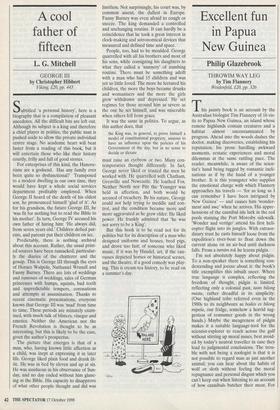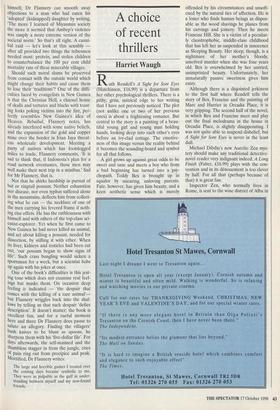Excellent fun in Papua New Guinea
Philip Glazebrook
THROWIM WAY LEG by Tim Flannery Weidenfeld, £20, pp. 326 This jaunty book is an account by the Australian biologist Tim Flannery of 16 vis- its to Papua New Guinea, an island whose remote highlands contain creatures and a habitat almost uncontaminated by progress. Ahead into the woods dashes the doctor, making discoveries, establishing his reputation, his prose hurdling awkward moments, ecstatic experiences and moral dilemmas at the same rattling pace. The reader, meanwhile, is aware of the scien- tist's hand being tugged by romantic incli- nations as if by the hand of a younger brother. It is this youngster who supplies the emotional charge with which Flannery approaches his travels — 'for as long as I can remember I have been intrigued by New Guinea' — and causes him 'wonder- ment and awe' when he arrives. His appre- hensions of the cannibal isle lurk in the red pools staining the Port Moresby sidewalk. `Wonder and vertigo' attend his first heli- copter flight into its jungles. With extraor- dinary trust he casts himself loose from the expedition's river-boat to float down the current alone on an air-bed until darkness falls. From a twilit?' tok he learns pidgin.
I'm not absolutely happy about pidgin. To a non-speaker there is something con- descending and jocose about it: the book's title exemplifies this inbuilt sneer. Where true language is complex, reflecting the freedom of thought, pidgin is limited, reflecting only a colonial past, taim bilong masta, rather dreadful in its simplicity. (One highland tribe referred even in the 1980s to its neighbours as boikis es bilong mipela, our fridge, somehow a horrid sug- gestion of consumer goods in the wrong hands.) Maybe the meagreness of pidgin makes it a suitable language-tool for the scientist-explorer to reach across the gulf without stirring up moral issues, best avoid- ed by today's neutral traveller in case they lead to judgmental conclusions. The trou- ble with not being a zoologist is that it is not possible to regard man as just another animal; you can hear about the habits of wolf or sloth without feeling the moral repugnance and personal disgust which you can't keep out when listening to an account of how cannibals butcher their meat. For himself, Dr Flannery can smooth away objections to a man who had eaten his `adopted' (kidnapped) daughter by writing, The more I learned of Miyanmin society the more it seemed that Ambep's violence was simply a more extreme version of the societal norm.' So that's all right. A canni- bal raid — let's look at this sensibly after all provided two things the tribesmen needed most: protein, and stolen children to counterbalance the 100 per cent child mortality rate of these miserable villages.
Should such moral slums be preserved from contact with the outside world which might change their habits and cause them to lose their 'traditions'? One of the diffi- culties faced by evangelists in New Guinea is that the Christian Hell, a charnel house of skulls and tortures and blacks with toast- ing forks poking victims into the fire, per- fectly resembles New Guinea's idea of Heaven. Rebaibal, Flannery notes, has already interfered with some native beliefs, and the expansion of the gold and copper mine over the border in Irian Jaya threat- ens wholesale development. Meeting a party of natives which has footslogged miles to trade, Flannery comments, 'It is sad to think that, if Indonesia's plan for a road network eventuates, these men may well make their next trip in a minibus.' Sad for Mr Flannery, that is.
Not that he shirks hardship in pursuit of bat or ringtail possum. Neither exhaustion nor disease, nor even typhus suffered alone in the mountains, deflects him from collect- ing what he can — the necklace of one of the men carrying his fevered frame if noth- ing else offers. He has the ruthlessness with himself and with others of the top-class sci- entist-explorer. Yet when he first came to New Guinea he had never killed an animal. and set about killing a possum, needed for dissection, by stifling it with ether. When its liver, kidneys and testicles had been cut out, 'our possum began to show signs of life'. Such crass bungling would sicken a sportsman for a week, but a scientist bobs up again with his jokes at once.
One of the book's difficulties is this jest- ing tone which does not examine real feel- ings but masks them. On occasion deep feeling is indicated — 'the despair that comes with the killing of a rare animal'— but Flannery wriggles back into the shal- lows by telling us that such despair 'defies description'. It doesn't matter; the book is excellent fun, and for a rueful moment here and there Dr Flannery does pause to salute an allegory. Finding the villagers' bush knives to be blunt as spoons, he sharpens them with his 'five-dollar file'. For days afterwards, the self-maimed and the thumbless stagger in from the jungle, cries of pain ring out from precipice and peak. Mortified, Dr Flannery writes:
The large and horrible gashes I treated over the coming days became symbolic to me. They were as palpable as the gulf in under- standing between myself and my new-found friends.











































































 Previous page
Previous page